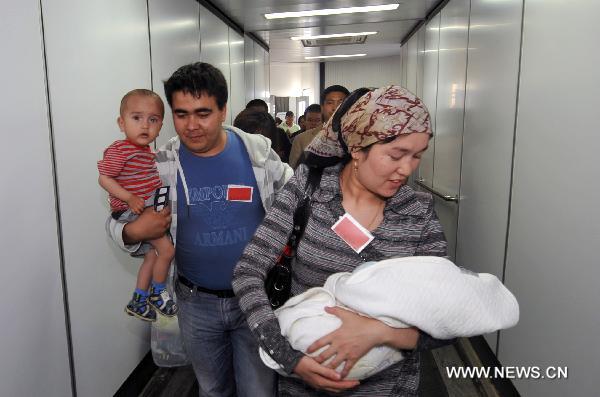Effective emergency evacuation demonstrates people-oriented diplomacy
When a seventh charted flight touched down at Urumqi airport in China's Xinjiang region on Wednesday, that meant that almost 1,000 overseas Chinese have now safely returned from riot-hit southern Kyrgyzstan.
 |
|
Chinese nationals walk out of the air bridge after another chartered plane carrying 191 Chinese nationals stranded in the violence-hit Kyrgyz city of Osh lands in Urumqi, capital of northwest China's Xinjiang Uygur Autonomous Region, June 16, 2010. [Zhao Ge/Xinhua] |
It has always been China's policy to not interfere with the domestic affairs of other nations, yet when it comes to protecting the rights and interests of its overseas nationals, the Chinese government will be fully mobilized.
The ever interdependent and interconnected world has witnessed an increasing number of Chinese going abroad to do business or pursue advanced education.
However, as the dream of world peace has been disturbed from time to time by either sporadic regional conflicts or complicated political turmoil, the safety and security of overseas Chinese has been considerably shadowed.
In many cases, overseas Chinese can be targeted quite easily in riots. In April 2006 when hundreds of demonstrators took to the streets to protest election results in the Solomon Islands, the ensuing violence destroyed more than 60 Chinese-run stores and buildings and led to the evacuation of some 400 Chinese nationals in an effort facilitated by the Chinese government.
The recent and on-going rounds of bloody riots in Kyrgyzstan, which saw the ouster of President Kurmanbek Bakiyev in early April, has again sunk the Central Asian nation into massive chaos. At the same time, the trouble also prompted the Chinese government's emergency consular protection mechanism to help its jammed-up citizens.
As the clashes continued, President Hu Jintao demanded that the Foreign Ministry and other related departments do whatever was necessary for a safe evacuation of China's nationals in Kyrgyzstan.
Though time and conditions were constrained, the Chinese government's actions were quick, concerted and effective, showcasing its readiness and professionalism in conducting such matters.
The actions also demonstrated the Chinese government's inclination to take a people-oriented diplomatic approach.
In fact, safeguarding the safety and legitimate interests of overseas Chinese has already become part of the daily responsibility of China's diplomatic efforts.
That responsibility includes a complete emergency response mechanism firmly in place in case that what happened in the Solomon Islands and Kyrgyzstan might be repeated somewhere else. The mechanism includes a joint inter-ministry session and emergency response regimes in China's various overseas agencies.
The success of the mass evacuation from Kyrgyzstan is yet another manifestation of the government's long-standing commitment to continuously improve the response mechanism for overseas emergencies.
 0
0 






